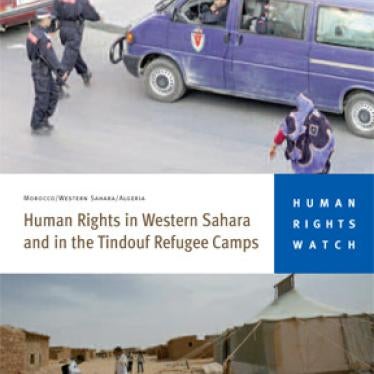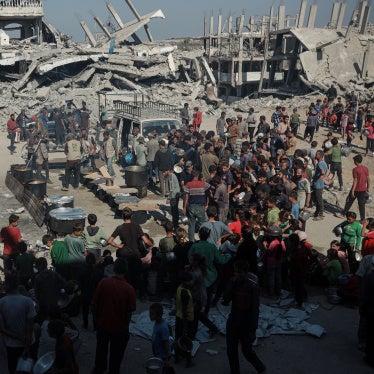(New York) - The Polisario Front, the Western Sahara independence movement, should allow a man it detained in September immediate access to his family, Human Rights Watch said today. The group detained Mostapha Selma Sidi Mouloud on September 21, 2010, accusing him of "treason and "espionage" on behalf of the "enemy" [Morocco] after he declared his support for Morocco's proposed solution to the Western Sahara conflict.
Although the Polisario announced Selma's release on October 6, he has remained confined to the remote outpost of Mehriz in the Polisario-controlled portion of Western Sahara while the United Nations High Commissioner for Refugees (UNHCR) works to arrange Selma's transfer to a country to which he is willing to go. While Polisario has facilitated telephone contact between UNHCR and Selma, it has not done so for his family.
"The Polisario Front says it's cooperating fully with UNHCR to resolve Selma's situation," said Sarah Leah Whitson, Middle East and North Africa director at Human Rights Watch. "But it is they who first detained him in a remote desert outpost six weeks ago, apparently because of his political opinions, and they need to let him be in touch with his family."
Selma lived with his wife and five children in the el-Ayoun camp, a Polisario-run Sahrawi refugee camp near Tindouf, Algeria. He worked as a police officer and reportedly had not engaged in any public political activity in the refugee camps. But on August 9, he held a news conference in Smara, in Moroccan-controlled Western Sahara, where he praised a plan Morocco has put forward for autonomy for Western Sahara as a viable third option between independence and full integration into Morocco. The Polisario arrested him as soon as he returned to territory under its control.
Relatives of Selma - both those living in the Tindouf refugee camps and others living in Moroccan-controlled Western Sahara - concurred in phone conversations with Human Rights Watch as recently as today that he has had no contact with his family since his arrest and that they wish to see him.
In Mehriz the only telephone coverage is with satellite phones. The Polisario has made a satellite phone available to Selma when UNHCR sought to speak with him.
The Polisario, which administers Sahrawi refugee camps in Algeria with the support of the Algerian government, demands that the political future of Western Sahara be decided by a popular referendum that includes independence as one option. A UN-backed plan to organize a referendum was set in motion in conjunction with a Polisario-Morocco ceasefire in 1991, but stalled in the face of opposition from Morocco, which rejects independence for Western Sahara.
Morocco has administered about 80 percent of the territory as if it were part of its own territory since seizing control of it when Spain, the former colonial power, withdrew in 1975. The international community does not recognize Morocco's annexation. The remaining part of the territory is controlled by the Polisario as part of the self-declared Sahrawi Arab Democratic Republic, which is recognized by dozens of countries.
In the Sahrawi refugee camps in Algeria, support for Morocco's autonomy plan is rarely heard publicly. The Polisario Front and its supporters consider Morocco an occupation force in their homeland and its autonomy proposal a denial of Sahrawis' right to self-determination.
In announcing Selma's release from detention, the Polisario asked UNHCR to take charge of arranging Selma's next move. UNHCR, which has staff based both in Moroccan-controlled Western Sahara and in the Tindouf refugee camps, has no presence in the Polisario-controlled part of Western Sahara, which includes Mehriz.
UNHCR has been in contact with the Polisario and with governments of neighboring and other concerned states to arrange a consultation with Selma about his options and preferences, and to arrange his transfer to a safe place of his choice.
UNHCR told Human Rights Watch that its staff has met regularly with Selma's family in the refugee camps and made phone calls to Selma himself, as recently as November 1. UNHCR said that it is confident from the conversations that the person on the other end of the phone was indeed Selma.
"Mostapha Selma may no longer technically be a Polisario prisoner, but there are no outside observers on the ground to verify he is being humanely treated," Whitson said. "The Polisario, as the party responsible for his well-being, should start by enabling him to communicate freely with his family."






